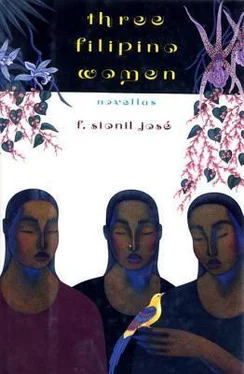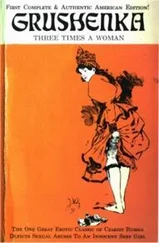Francisco Jose - Three Filipino Women
Здесь есть возможность читать онлайн «Francisco Jose - Three Filipino Women» весь текст электронной книги совершенно бесплатно (целиком полную версию без сокращений). В некоторых случаях можно слушать аудио, скачать через торрент в формате fb2 и присутствует краткое содержание. Год выпуска: 2013, ISBN: 2013, Издательство: Random House Publishing Group, Жанр: Современная проза, на английском языке. Описание произведения, (предисловие) а так же отзывы посетителей доступны на портале библиотеки ЛибКат.
- Название:Three Filipino Women
- Автор:
- Издательство:Random House Publishing Group
- Жанр:
- Год:2013
- ISBN:978-0-307-83028-9
- Рейтинг книги:4 / 5. Голосов: 1
-
Избранное:Добавить в избранное
- Отзывы:
-
Ваша оценка:
- 80
- 1
- 2
- 3
- 4
- 5
Three Filipino Women: краткое содержание, описание и аннотация
Предлагаем к чтению аннотацию, описание, краткое содержание или предисловие (зависит от того, что написал сам автор книги «Three Filipino Women»). Если вы не нашли необходимую информацию о книге — напишите в комментариях, мы постараемся отыскать её.
and
-examine the Philippine experience through the lives of three female characters, a prostitute, a student activist, and a politician.
Three Filipino Women — читать онлайн бесплатно полную книгу (весь текст) целиком
Ниже представлен текст книги, разбитый по страницам. Система сохранения места последней прочитанной страницы, позволяет с удобством читать онлайн бесплатно книгу «Three Filipino Women», без необходимости каждый раз заново искать на чём Вы остановились. Поставьте закладку, и сможете в любой момент перейти на страницу, на которой закончили чтение.
Интервал:
Закладка:
I felt that she reluctantly brought me up to the house afterwards because she did not want me to see its rich interior. But I wanted to meet her father, this man who had taught her vision and forebearance. He sat before a TV set, listening to a documentary on Japanese culture. When we entered the room, he turned to the sound of our entry. His eyes were unblinking, glimpsed through the dark glasses. He extended his hand and I grasped it. His grip was strong and warm. Malu was right — if I did not know, I would have thought he was not blind at all. “So, at last” he turned to her. “You have brought a young man home. I suppose it is serious then.”
Malu pinched my arm. “Yes, sir,” I said, not minding her.
“Well, Malu has one more year in college. I suppose both of you can wait.”
Malu was glaring at me even as I said, “Hardly, sir.”
There was exuberant closeness in the family. Malu was the youngest and was the favorite. She had a way with almost anyone and was headstrong. I knew they accepted me when her father told me to forgive Malu’s vaulting enthusiasms. And boys, it seemed, were not one of them. He tolerated her politics; she was doing, he said, what he would do were he young again.
The audience over, Malu took me to the garden.
Again, the familiar cliches about the working class, the blighted rural areas.
“But do you really know how it is over there? In the most depressed parts of the country?” I questioned the factual basis of her judgments. “You have never lived on a farm,” I said, badgering her.
“Do you know how I can be in one?” she asked. “I will bring a team — all girls, at least a dozen of us.”
Uncle Bert had this farm in Albay, but if they stayed with him, they would be comfortable. I asked him to arrange for the “education” of a dozen colegialas , that they be exposed to the worst conditions in Bicol. Uncle Bert laughed and said he would see to that.
After the semestral break, she returned from Albay sunburned, her hands blistered. But there was a radiance in her face. They had paid economy fare at Tutuban station. They did not bring any food because they thought they would have their meals in the first-class restaurant on the train. They were herded into a dusty coach which pitched and loped when they were finally on the way. Vegetables and crates were piled on the corridors and platforms. There was no place for them to sit except on the crates. They got hungry and there was no restaurant in third class.
Some passengers offered them their food — cold chunks of rice with pieces of dried fish wrapped in banana leaves. They bought additional food from vendors in the stations.
The farm she was assigned to was at the foot of a mountain, and isolated. Many days she felt she would simply go mad. She would wander beyond the house and shout her lungs dry just so she could hear herself. After mundane conversations with the family, she had no one to talk with, nothing to read. She did not bring a novel, not even a writing pad, and the family did not have a transistor radio. There was no flush toilet and worse, she forgot to bring toilet paper.
The family’s lack of interest in politics of the kind she believed in did not faze her; she had met the same skepticism and even suspicion in the slum families of Tondo when she started teach-ins. She had to talk with them in terms of their needs, what they could relate to in their daily lives — why prices of copra were low, who made the money in the trade, and why they worked so hard and yet earned so little.
She was amazed at their endurance. They would climb the foothills to gather coconuts then bring them to the yard where they were husked. The two youngsters in the family who were not even in their teens carried four coconuts each and she carried only two. By the time she reached the top of the hill, she was so tired and breathless from crawling on her knees and hands, while her young companions would still be bouncing ahead of her. She also helped in the harvesting in the valley. Bent over in the field, she could only work briefly in the morning when it was not too hot. She would be drenched with sweat, she itched horribly, and her back ached so much she thought it would break.
She had brought some canned food and was sure the family fed her with the best they could afford. She did not want to appear conspicuous so she brought her oldest clothes. There was a funeral in the village, but even with her rags, she was the best dressed.
Still, she was when she returned home, as I said, radiant.
TWO
It was not my intention to wean Malu from her politics, just see to it that she saw the other side, that progress was not a result of a class war, that motivation was important, and that as a student of psychology, she should recognize this.
I saw her almost daily during lunch when school started again if she was not in the slums or in demonstrations at the American embassy and Malacañang. I was going to graduate in a few months and had already started working in the family business. Perhaps it sounded flippant when I asked if she was now ready, after all her experiences, to move out of Dasmariñas and lead the revolution.
She was not usually given to flare-ups, but this time, she all but screamed, “Damn your money! How much do you pay your workers?”
I did not let that pass. I asked if she ever understood why so many generations stayed on in Tondo which had been there in Bonifacio’s time, and even earlier. “They are lazy, they lack initiative,” I told her. “You can love humanity — but it will not change.”
“And why should they not be lazy?” she flung back. “This is the whole debilitating effect of colonialism. They work so hard and still don’t make enough. Or eat enough.”
“In our furniture factory,” I said, “there is a lot of absenteeism after payday. What do they do? They get drunk and don’t report for work for three days. They don’t save. I can go through a long list.”
“But not in the farms where your uncle sent us.”
“They are not his farms. All of us, we give justice to our workers.”
“They work very hard,” she went on. “Without rest, and when all is done, there is still very little for them.” Then she challenged me. “I bet you have never been in a slum, you have never been inside a poor man’s house, in Tondo or anywhere.”
She trapped me, all right, and that very afternoon, it was my turn. We drove to Barrio Magsaysay where her group was organizing action teams.
We parked in the bay boulevard because we could not get through the maze of alleys. It was late November, the rains had paused; otherwise, as she explained it, we would have to wear boots because the alleys became rivulets of fetid mud. When we got there, what disturbed me really was not the sorry construction, the pigsty atmosphere — it was the eagerness, the dedication on her face as we entered this misshapen world of people who greeted her with warmth.
She introduced me to Charlie — a frail boy of fifteen who looked much older, and like all youths in the slum, he had dirty skin and bad teeth. He was in faded shorts and his rubber slippers were about to break apart. Wherever we went, he followed. He adored Malu and for a while, I was jealous.
“He is the brightest boy in the Barrio,” she said, enthusiastically. He had organized the youngsters and got them to clean the alleys, keep order. He was out of school; he would have been a high school junior had he enrolled, but his tuition money went to the hospital when his father fell ill. He helped at a stall in Divisoria, got three pesos a day plus some leftover, wilted vegetables.
There were many things that Malu could have done for them but she felt they must do a lot for themselves and I agreed. Still I knew that someday, if it had not already happened, they would possess her and I did not want that. I coveted her.
Читать дальшеИнтервал:
Закладка:
Похожие книги на «Three Filipino Women»
Представляем Вашему вниманию похожие книги на «Three Filipino Women» списком для выбора. Мы отобрали схожую по названию и смыслу литературу в надежде предоставить читателям больше вариантов отыскать новые, интересные, ещё непрочитанные произведения.
Обсуждение, отзывы о книге «Three Filipino Women» и просто собственные мнения читателей. Оставьте ваши комментарии, напишите, что Вы думаете о произведении, его смысле или главных героях. Укажите что конкретно понравилось, а что нет, и почему Вы так считаете.












